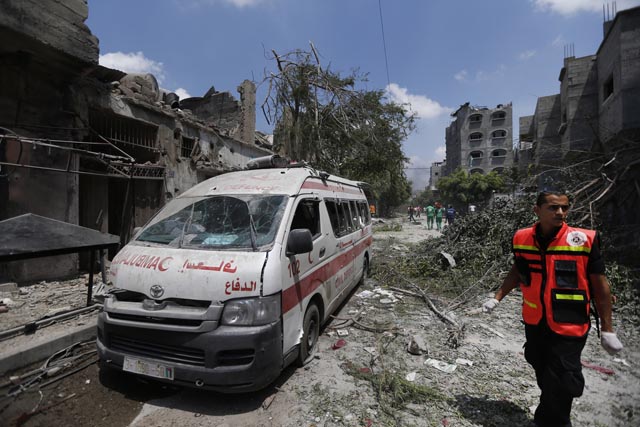GAZA CITY — At a dingy Gaza ambulance station, paramedics struggle to stay awake during 24-hour shifts that see them coming under fire, and dealing with the deaths of civilians and even colleagues.
The men describe themselves as a family, bonded together by experiences that are difficult to comprehend.
They have collected body parts and dead children; they have been trapped between Israeli shelling and Hamas sniper fire; and several of them have been wounded.
Shift supervisor Jihad Selim has been a paramedic for 17 years and has no regrets, despite having worked through three wars and the violence of the second Palestinian intifada, or uprising (2000-2005).
But he wouldn’t want to see his children follow in his footsteps.
“The things we see are very hard,” he told AFP.
“We go into a house and we find a body torn into pieces, someone picks up a hand and gives it to you, and says ‘take it’.”
“But these are things we’re used to.”
Adel Al Azbut, 30, is similarly stoical about the horrors they encounter on a daily basis.
“To be honest, I just get on with it,” he says.
“If I see pieces of a body, my professional responsibility requires that I just deal with situations like that and do it in a professional way.”
Adding to the pressure is that fact that they all have families at home and many admit that their deepest fear is getting an emergency call from their own home.
Non-stop calls
Azbut decided he wanted to be a paramedic during the second intifada, impressed by the work done by first responders treating people in the Gaza Strip.
“The best thing for any human being to be able to do is to help another human being,” he says.
“I’m honoured that I’m someone who is able to help people.”
In the background, the phone rings constantly.
Often it is nothing more than children, bored at home, who ring the emergency service’s toll-free number for fun.
“The worst thing that ever happened to us was them making our number toll-free. Now in Gaza, if you want to make sure the sound on your phone is working, you call our number,” Selim says ruefully.
But often it is far more serious.
Families living in flashpoint border areas sometimes make desperate calls in the hope of being evacuated by ambulance, but Selim can’t send anyone without first coordinating with the International Committee of the Red Cross.
On Sunday morning, paramedic Fuad Jaber was killed in the Shejaiya neighbourhood during an intense Israeli bombardment that killed at least 72 people.
A convoy of ambulances escorted his body to the family home, his colleagues weeping openly as his body was carried in to his wife and two-year-old daughter.
Brothers in suffering
But even during wartime, there are more ordinary emergencies.
An ambulance speeds through the streets to find an eight-year-old girl who has fallen from the third floor of a building.
The paramedics put splits on her legs, her neck in a brace, and take her and her frantic parents to Gaza City’s Shifa hospital.
“Sometimes it’s shelling, sometimes it’s an accident. During wartime, we get a cocktail,” says the attending paramedic with a smile.
Selim says the latest conflict, which began on July 8, has been even worse than the previous two Israeli operations in 2008-9 and 2012.
“Every war is more difficult than the one before, to be honest. There isn’t a country in the world that has had to deal with three wars in six years,” he says.
But the paramedics pull together to support one another.
“We’re like a family here and we treat each other like that, we’re like brothers,” Selim says.
“We deal with situations together, we help each other out, we sleep and wake up together.”
For all the suffering they experience, or perhaps because of it, the atmosphere at their ambulance station is lighthearted.
The men argue over what they’ll have for dessert with the dinner that breaks the daytime fast observed by Muslims during Ramadan and who had the hardest shift last night.
“We try to keep it light,” says Azbut.
“Because we know at any minute a call could come and we’ll all go out, and we don’t know who will come back.”
